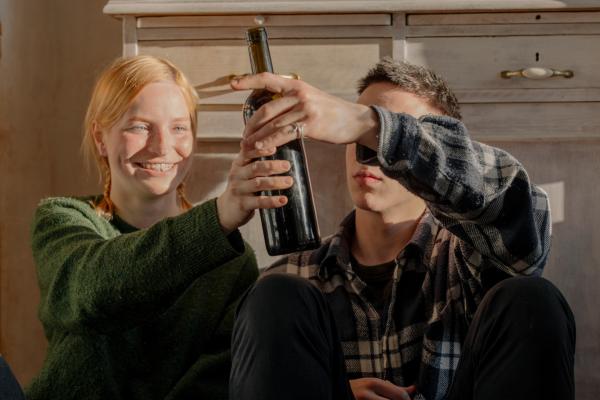Alcohol and abuse
Do you no longer feel in control of your alcohol use and does ‘wanting to' drink often switch to ‘having to’ drink? Then you might be dealing with alcohol dependency or addiction.
It was very hard for me to admit to my family that I had a drinking problem.

Did you know this?
In society, alcohol is often considered important and ‘normal’. 70% of all adult alcohol addictions originate in student life. Approximately 30% of students drink too much alcohol. The number of students addicted to alcohol remains stable at 2 to 5%. The most notable increase is found in drinking patterns such as binge drinking, pregaming and drinking games. Youngsters who have a drinking problem usually find it difficult to take the first step towards seeking (professional) help.
What alcohol does to the body
Alcohol has a direct effect on the body. It numbs the brain and affects your emotions: it can trigger feelings of elation or audacity, but also aggression, carelessness, rest, sleepiness, relaxation, apathy or indifference.
Consuming large amounts of alcohol slows down your responsiveness and reaction time. You hear and see less sharply. Your self-confidence can increase to a misleadingly high degree and turn into boldness. This can be dangerous, for instance in traffic. As such, alcohol use is a key risk factor for accidents and injuries.
An even greater amount of alcohol lowers your control over your movement and coordination skills. Walking turns to staggering, and talking to lalling. Often, you fail to remember exactly what has happened or what has been discussed. Excessive alcohol consumption can put you in a coma and cause heart problems.
The effect of alcohol: different for everybody
Alcohol does not affect everyone the same. While one person may feel tipsy after one shot, the other needs several glasses to feel any impact. Some like the effects of alcohol, others simply hate them.
As a youngster, you are likely to feel the effects of alcohol faster and more intensely since you are smaller, lighter and still growing. Therefore, your brain, nervous system and organs are more vulnerable to the harmful effects of alcohol. Drinking a lot at a young age can lead to irreparable damage.
There is also a slight difference between males and females. As alcohol is dispersed through bodily fluid and males generally have 10% more fluid than females, the latter get tipsy more quickly and intensely.
When does alcohol use become problematic?
There is no clear answer to this question, it depends (among other things) on the amount of alcohol you consume, how you consume it and how long you are or have been drinking.
When you are no longer in control of your alcohol use, ‘wanting to' drink changes into ‘having to’ drink. You start becoming dependent on alcohol and no longer functioning well without it. The desire for alcohol is always on your mind.

Alcohol dependence is situated on two levels:
- Physical dependence: when you do not drink for a while, you start to experience withdrawal symptoms such as sweating, shaking, a feeling of tension, and trouble sleeping.
- Psychological dependence: when you cannot drink, your mood is affected, i.e., you become irritable or anxious. Despite hangovers and withdrawal symptoms, you continue to consume alcohol.
Alcohol dependence is harmful both physically and mentally, but it can be damaging for your surroundings as well. It may bring about health and financial problems, and arguments with relatives and loved ones. You may start to perform badly, feel lonely and develop psychological issues. There is even a risk of dragging yourself and/or others into dangerous situations.
There are four types of excessive alcohol use:
- Excessive drinking: you drink more than appropriate for your health. This behaviour may go hand in hand with certain circumstances (like going out) or problems (for instance, a conflict with your partner), but this is not always the case.
- Alcohol abuse: alcohol starts to occupy a significant role in your life as a way to relax, escape from problems, enjoy yourself, start off the evening, and so on. Despite physical, psychological or social problems you continue to drink.
- Binge drinking: drinking a large amount of alcohol over a short period of time, i.e., at least 6 glasses in 2 hours for men, and 5 for women. Persons who binge drink do not seek to enjoy alcohol per se, but mainly want to quickly slide into a drunken haze.
- Alcohol dependence or addiction: you are no longer able to function without alcohol, and you are physically and/or psychologically dependent on it. Despite hangovers and withdrawal symptoms, you continue to drink.

Withdrawal symptoms
When you reduce your alcohol intake or stop drinking altogether after a period of excessive use, you can start to experience withdrawal symptoms like shaky hands, sweating, muscle cramps, dreariness, an agitated or anxious feeling, fatigue or sleeping problems.
Withdrawal symptoms differ from one person to the next. Some people struggle more than others. Usually, these symptoms start to appear from the first week in which you reduce or stop your alcohol intake. After a few days, they tend to diminish, yet feelings of agitation, anxiousness, dreariness and sleeping troubles can sometimes linger.
How to control your alcohol consumption
Alcohol is and remains a harmful substance. Therefore, we’ve listed a number of tips below to help you control your alcohol consumption:
- Only drink in your free time.
- Make sure you’ve eaten properly before consuming alcohol.
- Do not drink more than 10 standard glasses per week, and no more than 3 standard glasses at a time.
- Preferably spread your alcohol intake over several days a week. Schedule at least 2 alcohol-free days per week to recover physically and to prevent drinking from becoming a habit.
- When you are thirsty, drink water. Alternate a round of alcoholic drinks with water. In this way, you automatically ingest half the amount of alcohol, and you keep your hydration levels stable. As a matter of fact, dehydration is what causes serious hangovers.
- Take small sips of your drink and try to enjoy each one of them.
- Learn to say “no” more often and opt for alcohol-free drinks.
- Determine what and how much you will consume in advance, and stick to it.
- Set a time to quit drinking alcohol.
Changing your alcohol consumption pattern is not always easy. It can be quite challenging to keep your promise and deal with peer pressure, especially at the beginning. Focus on your goal and reward yourself! Be proud of saying “no” and think of it as a “yes” to yourself and your health.
I am glad I took the step to work on my problem. It felt good to finally be able to talk to someone about my troubles.
Talk about it
Do you feel you drink too much but do you struggle to talk about it? A lot of people are ashamed and find excuses for their alcohol abuse. However, alcohol dependence is nothing to be ashamed of, it can happen to anybody. If you are worried, try to open up and start a conversation. Talk to somebody you trust and feel good around, preferably someone you know, like a good friend, your parents or siblings. This can bring relief and help you sort things out. You can also find help together.

If you struggle to talk to someone in your close surroundings, try to approach a person who is who is familiar with such experiences, such as a GP or student counsellor at your college or university.
Would you prefer to share your story anonymously? You can always call on Awel (102 or awel.be) or Tele-Onthaal (106 or tele-onthaal.be). If you have dark thoughts or questions about suicide, contact the Suicide Hotline (1813 or zelfmoord1813.be). bellen.
How to tackle your alcohol consumption
If you want to drink less or stop drinking altogether, you can also find support in online programmes. Contact the dedicated substance abuse centre ‘Druglijn’ for any questions concerning alcohol, drugs, pills, gaming and gambling. Self-tests and self-help modules are also available there.
Seek help
Do you feel you are not able to manage by yourself? Then it is important to rely on professional help, for example through health care professionals who specialise in alcohol abuse. You can request more information, anonymously, through ‘Druglijn’ or directly via your general practitioner.
Multiple types of assistance and help are available, yet there is no single magical method that will solve all your problems at once. Practically all types of help have a couple of workable elements in common, such as:
- enhancing your motivation to quit or reduce your alcohol consumption
- treating withdrawal symptoms
- where appropriate, medication to support you in your recovery
- teaching you to identify your specific risks and triggers
- enhancing your self confidence, for example by emphasising your abilities and skills
Crossing the line: students & expert sharing their experiences
Alcohol and substance abuse is het central topic of this episode. Host Carola talks to student Louise and professor dr. Ronny Bruffaerts (KU Leuven), expert in the field of mental health issues.
Worried about someone?
Have you noticed a friend drinking too much? You may be unsure of what to say or do. Openly discuss the problem, do not judge and share your concerns.
Keen to learn, read or hear more about this topic?
Podcasts
Self-help
-
Alcoholhulp.be allows you to get to work independently or with help if you want to reduce your alcohol consumption or stop drinking altogether. The website also features a self-test. (Dutch)
-
Druglijn enables you to ask any questions you may have about alcohol, drugs, pills, gaming and gambling. Self-tests and self-help modules are also available here.
-
Maxx app supports you in a positive and practical way in your attempt to drink less or stop drinking altogether. (Dutch)
Websites
- VAD (Vlaams Expertisecentrum Alcohol en andere drugs) is the Flemish expertise centre for alcohol and other drugs. Here you can find relevant info on alcohol, illegal drugs, psychoactive drugs, gaming and gambling.
- Anonieme Alcoholisten, SOS Nuchterheid, Bewustveranderen and Projectjongeren are self-help groups where you can find shelter, support and practical information. (Dutch)
Powerful stories
You are not alone. Get inspired by other students' stories about vulnerability and doubt. But above all about the power of connectedness.
Go to the stories